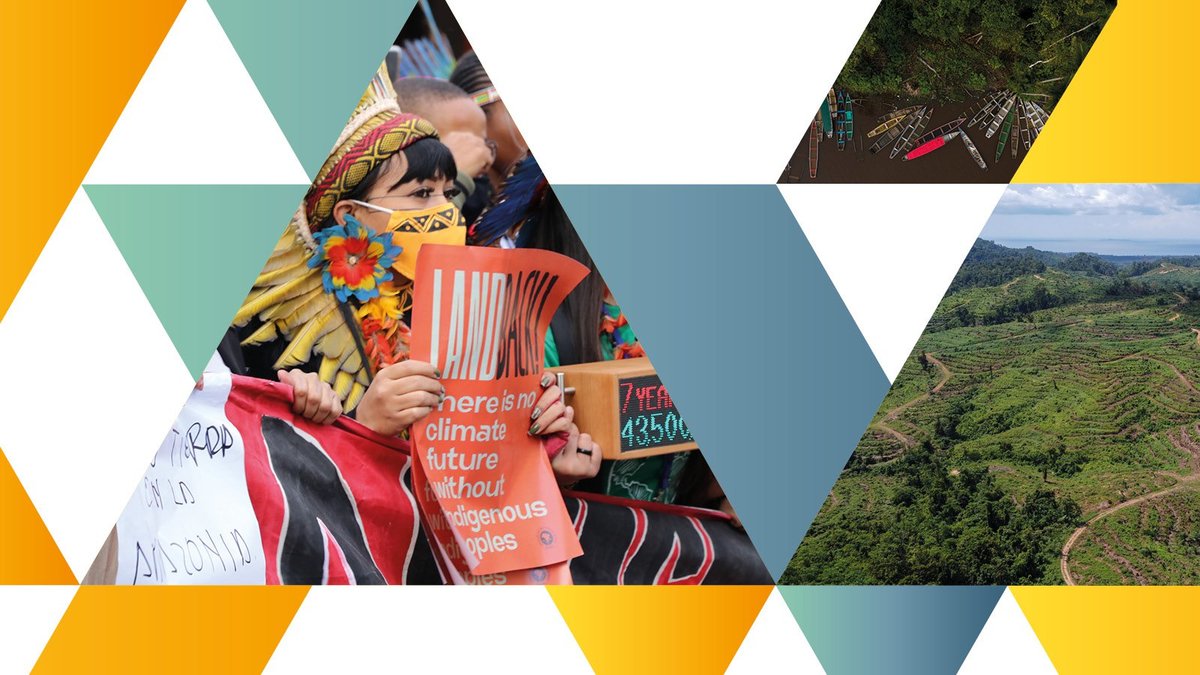Foreword from Mike Davis, CEO of Global Witness
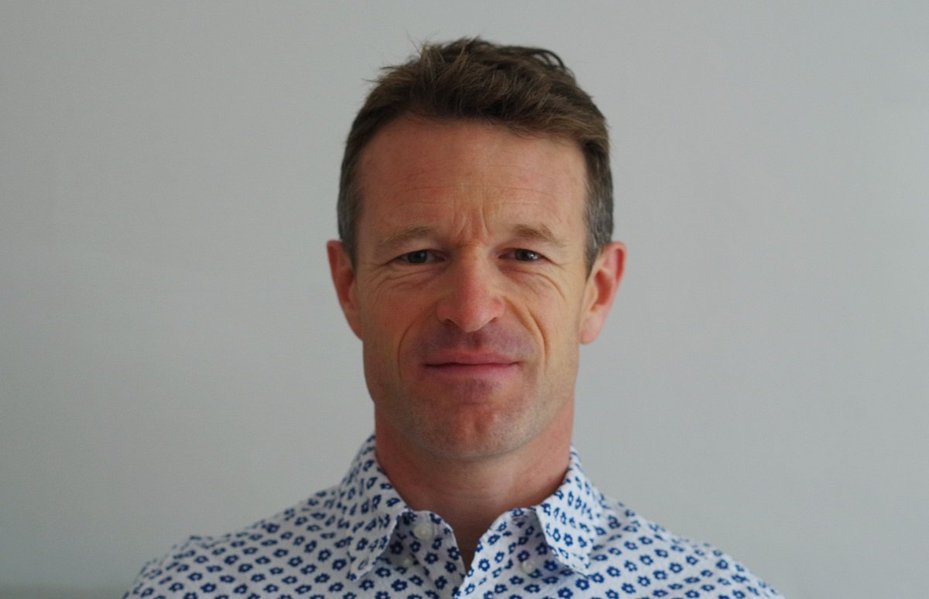
Mike Davis, Global Witness CEO. Global Witness
2021 was lived under the shadow of COVID-19. Perhaps more than any other time in recent memory, it was a year that starkly reminded us of the contrast between the experiences of those living in wealthier countries, who had access to vaccines and testing that allowed some semblance of normal life to return, and those in countries where vaccination programmes were unable to get off the ground.
Despite the logic and global solidarity behind the oft-repeated mantra “no one’s protected until we’re all protected,” there remains too little political will behind a truly global vaccination effort, with the poorest, particularly communities of colour, still struggling to secure the necessary healthcare.
If the world’s response to COVID-19 is an indication of how we will face other crises, there is reason for both hope and anxiety.
On the one hand, we have seen how huge economic resource can be mobilised quickly and fairly efficiently to tackle urgent problems.
We all experienced the sense of collective effort, good will and shared endeavour that characterised some of our time living through the uncertainty of lockdowns and restrictions. And we have seen some interesting and important alliances formed – between political parties, between community groups and the private sector, between government and academia.
However, we’ve also seen the ugly nationalism and racism in vaccine hoarding. We’ve seen the unrelenting focus on profit by some, even at the expense of people’s health. And we’ve seen the failure of political leadership to seek to build a better, more equitable future out of the global chaos wrought by the pandemic.
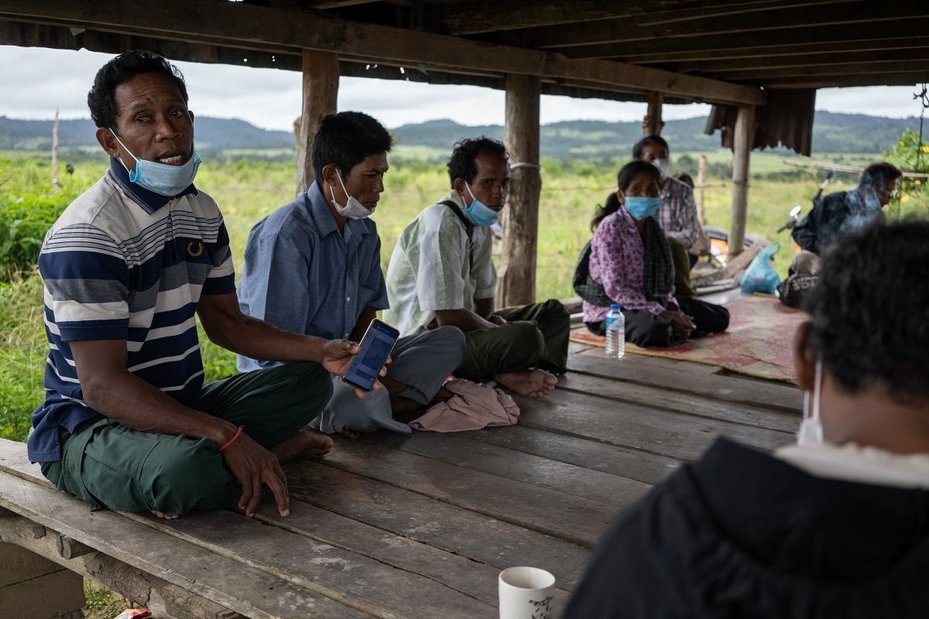
Families gather to discuss the ongoing case against Tate & Lyle in Koh Kong Province. Global Witness
There may be lessons to draw here for Global Witness, as an organisation firmly focused on the goal of addressing the underlying causes of the climate emergency and pushing for a just transition to empower and prioritise the voices, campaigns and solutions of the communities most affected by extreme weather and unbearable temperature rises.
Of course, the unsustainable rate of global heating was the other big story dominating 2021, with many political centres round the world collectively recognising in public statements for the first time that we are living through a planetary crisis and committing to action to protect people, our forests, our oceans, and our biodiversity.
However, despite the proliferation of climate catastrophes in almost all parts of the world, from forest fires to floods and drought, and despite the overwhelming evidence that the change in our climate is causing famine, loss of home and habitat, mass migration, and poverty, too little is being done to address the primary factors underpinning the problem.
Profit is still prioritised over people and planet, and the toxic relationship between political leaders and major polluting companies remains a barrier to action.
I am proud of the impact Global Witness achieved last year to uncover the role the fossil fuel industry, big agribusiness and the financiers funding deforestation played in the continued deterioration of our climate, and our efforts to hold those responsible to account. We have highlighted just 10 of these impacts in the next section of this review.
2021 saw a redoubling of our efforts to work better in partnership with organisations, campaigning groups and activists from across the climate movement, but particularly across the Global South and most affected regions.
Our annual report on the killings of land and environmental defenders set out in clear terms the challenge we face to ensure justice and human rights are at the heart of efforts to defend the planet.
In 2020, we recorded 227 lethal attacks – an average of more than four people a week – making it once again the most dangerous year on record for people defending their homes, land and livelihoods, and ecosystems vital for biodiversity and the climate.
Alongside this, we launched our first ever podcast, bringing the stories and campaigning experiences of these communities to a new audience, presented by Ugandan youth climate activist, campaigner and author, Vanessa Nakate.
This sat alongside an unprecedented number of opinion pieces, films, quotes and photography, intended to showcase the work of our partners, the challenges they face and the achievements they have secured.
In June, we held a two day global event, entitled Time for a Climate Revolution, which featured 27 speakers from across six continents, including US, UK, India, Chile, Uganda and Nigeria, sharing their campaigning experiences and asks for global leaders. It drew attendees from 32 countries and our wider content reached 4 million people.
We are committed to doing more of this, doing it better, and more intentionally bringing these collaborations into the way we work as we continue work to pursue our aim of achieving climate justice.
Nowhere was this more demonstrable than the organisation-wide effort to galvanise change at the COP26 climate summit in Glasgow.
Delayed by a year, the conference was rightly plagued by questions of legitimacy, given that so many climate activists, particularly from Indigenous communities and representatives from countries feeling the worst impacts of global heating, were excluded from attending.
We sought to do what we could to bring the anger and the calls for definitive commitments to address the inequality at the core of the global response to mitigating the impacts of the climate emergency to those gathering in Scotland.
Across our digital campaign over the two weeks of the conference, which highlighted the toxic relationship between governments and big business, we featured 160 influential activist voices from across 15 different countries each carrying their own message to world leaders.
During the conference we published new research exposing the outsized presence of fossil fuel lobbyists at the event, showing that over 500 delegate passes had been provided to this group, collectively making it bigger than the delegation of any other country – and bigger than the combined total of the eight delegations from the countries worst affected by climate change in the past 20 years.
Our findings dominated discussions across the second week of the conference and forced organisers, including UN representatives and the British COP president, to respond and account for this decision.
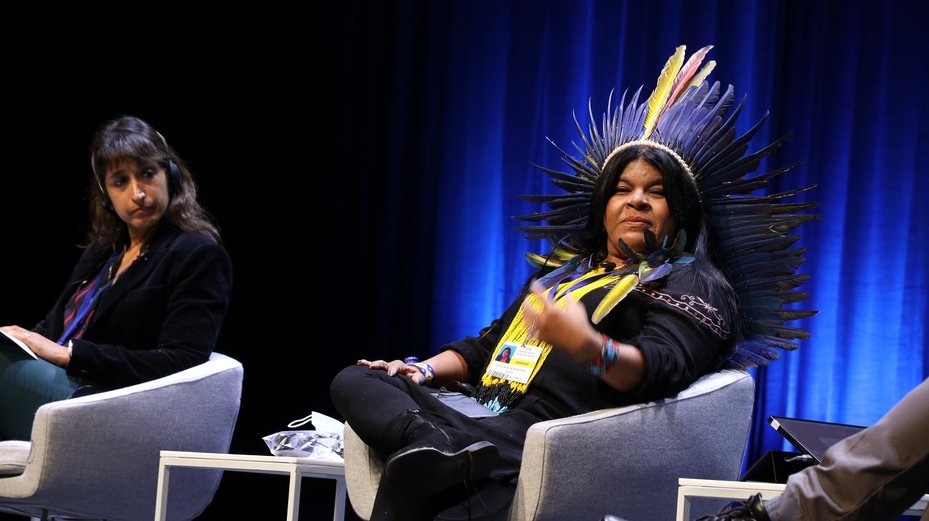
Sônia Guajajara and Global Witness’s Seema Joshi speak at COP. Global Witness
As we entered 2022, we, like other organisations had plans to build on our work of the previous year, particularly our important campaign to continue to hit the political capital of the big oil and gas companies to stop their ongoing role as a purveyor of misleading, distracting and false narratives aimed at blocking real action on climate.
However, Russia’s brutal invasion of Ukraine caused us to rethink our plans.
After we were approached by a group of Ukrainian diaspora to run a campaign on Russian blood oil, we swiftly recalibrated, moved staff from across the organisation to build a new team monitoring and exposing the companies helping fund Russia’s war effort by trading in Russian fossil fuels.
Since then, our work has contributed to changes in policy from major companies, including Total, Shell, BP, Exxon, P&I insurers and commodity traders like Vitol and Trafigura. We have also galvanised tens of thousands of people to join our calls for a robust oil and gas embargo against Russia across the EU.
This is a time of great worry – the planet is overheating, more people are suffering the ill effects of the climate crisis, inequality is becoming further embedded, states and companies are complicit in terrible human rights abuses and conflict continues to rage, including in Ukraine.
However, it is also a moment of great possibility. The climate movement is stronger and more diverse than ever before, with the voices of those most impacted finally being brought to the fore.
The case for change is being made through every possible avenue – uncovering those polluting or funding the destruction of our planet, protesting against companies attempting to delay or distract from the action needed, holding governments to account through protest or in courts of law, and persuading the public that systemic change is required to the way we live and consume.
The war in Ukraine has made some world leaders question a future energy package which continues to have the extraction and burning of fossil fuels at its core as the frantic scramble gets underway to move away from the import of Russian oil and gas, and companies are more often called out for their greenwashing and hypocrisy, including by Global Witness.
None of our work would be possible without the incredible support of our funders. We want to thank you all for backing Global Witness’s mission and for providing us with the basis to move with agility to respond to emergencies where our expertise is needed and to seize fresh opportunities as soon as they arise.
In an era of considerable volatility and uncertainty, this is all the more precious. Thank you!
Our case for change
Global Witness campaigns and impact
In our work, we fight to protect the most climate critical forests and those that defend them by constraining the financing driving their destruction.
We help stop the fossil fuel industries’ efforts to secure even more taxpayers’ money to bankroll projects that pose an existential threat to life on our planet.
And we take on the corruption of our political, economic and digital systems that allow these things to happen.
We are addressing these priorities through six mutually reinforcing campaigns:
- Stop the oil and gas industry escalating global warming by making us dependent on gas
- Reduce the destruction of climate-critical tropical forests by constraining the financing of the industries driving it
- Protect Land and Environmental Defenders by taking on the industries most associated with attacks and killings
- Tackle digital threats to democracy, particularly the role of Big Tech social media firms
- Ensure corporate accountability for environmental and human rights abuses
- Ensure that the current energy transition is fair and responsible, serving people and the planet.
Our major impacts in 2021
We have achieved a lot in 2021, both in terms of tangible changes to legislation and in building the foundations for our longer-term campaigns. Here we have highlighted 10 of our most significant impacts from the last 12 months:
Tackling deforestation
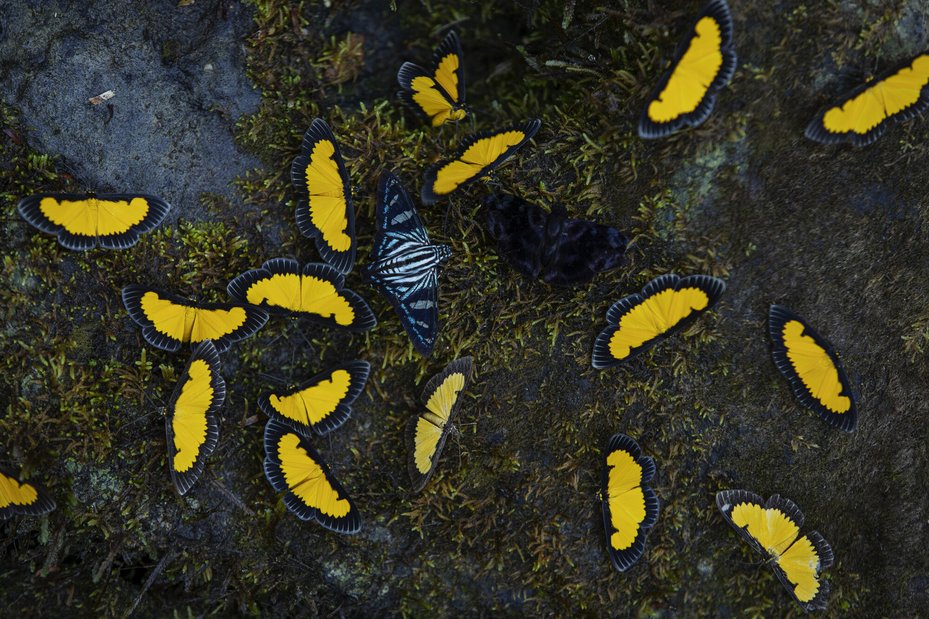
Biodiversity in Acre state, Brazil, November 2020
Irresponsible businesses, including financial institutions, are driving the destruction of climate-critical tropical forests, and the communities and biodiversity that rely on them. We are campaigning to end the flow of money to reckless businesses - particularly damaging agribusinesses - enabling this deforestation.
1) New legislation achieved in the UK
In the UK, the Environment Act was formally adopted, including a provision prohibiting UK companies from using goods from illegally deforested land and requiring them to undertake due diligence checks across their supply chains. Global Witness was instrumental in getting the UK government to introduce this.
We mobilised our supporters and undertook advocacy alongside other organisations, using evidence gathered on UK links to global deforestation through our investigative work to influence government Ministers and officials, as well as parliamentarians.
Our briefings shaped debates, media coverage and wider amendments on the draft law as it made its way through parliament – making the case for stronger protections of Indigenous people and local communities, addressing the role of UK finance fuelling deforestation and tackling all deforestation, not just that deemed illegal.
2) Company action in response to our investigative findings
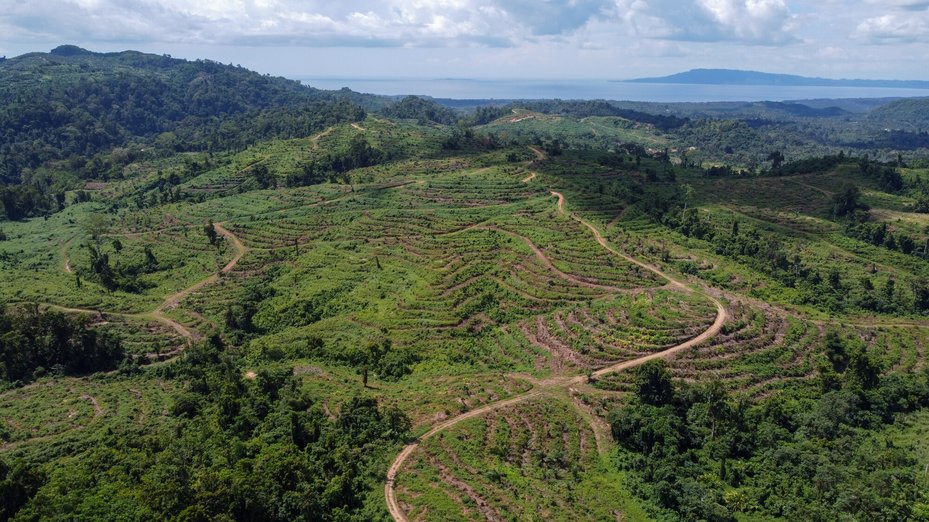
Land has been cleared for palm oil plantations in Papua New Guinea
In October, we published a new investigation tracing palm oil from the forest-destroying Papua New Guinea plantations of East New Britain, Bewani and Rimbunan Hijau through global supply chains to products made by household brands including Hersheys, Nestle, Kelloggs, Colgate, PZ Cussons (which makes Carex and Imperial Leather), Danone, Cargill, Reckitt (Strepsils, Neurofen, Dettol, Finish), AAK, Nestlé and General Mills.
The majority of companies named responded by immediately suspending relevant suppliers.
Elsewhere, the beef giant JBS also stopped working with two ranchers Global Witness found had used slave labour, carried out illegal deforestation, land grabbing, cattle laundering and were involved in human rights abuses against landless peoples.
This followed our engagement with the company, presenting them with the evidence we had compiled as part of our investigations.
3) Strong EU legislation proposed supporting Global Witness’s aims
In November, our long-running campaign to stop goods entering the EU market that are derived from deforested land made real headway.
Proposed legislation was published which included provisions to end products made from soy, beef, palm oil, wood, cocoa and coffee contributing to deforestation, and requiring companies to undertake formal checks of their supply chains to assess the risk they are driving further destruction of tropical rainforest.
Our advocacy work over many years along with other NGOs, building allies, making the case for legislation and using evidence gathered via investigations into the EU’s links to global deforestation was instrumental in securing these sections of the proposed law.
We are now working with our coalition partners to ensure the final version is as robust as possible. We have also brought together a range of NGOs, key MEPs and businesses to back our calls for the legislation to cover deforestation finance.
4) Companies investigated
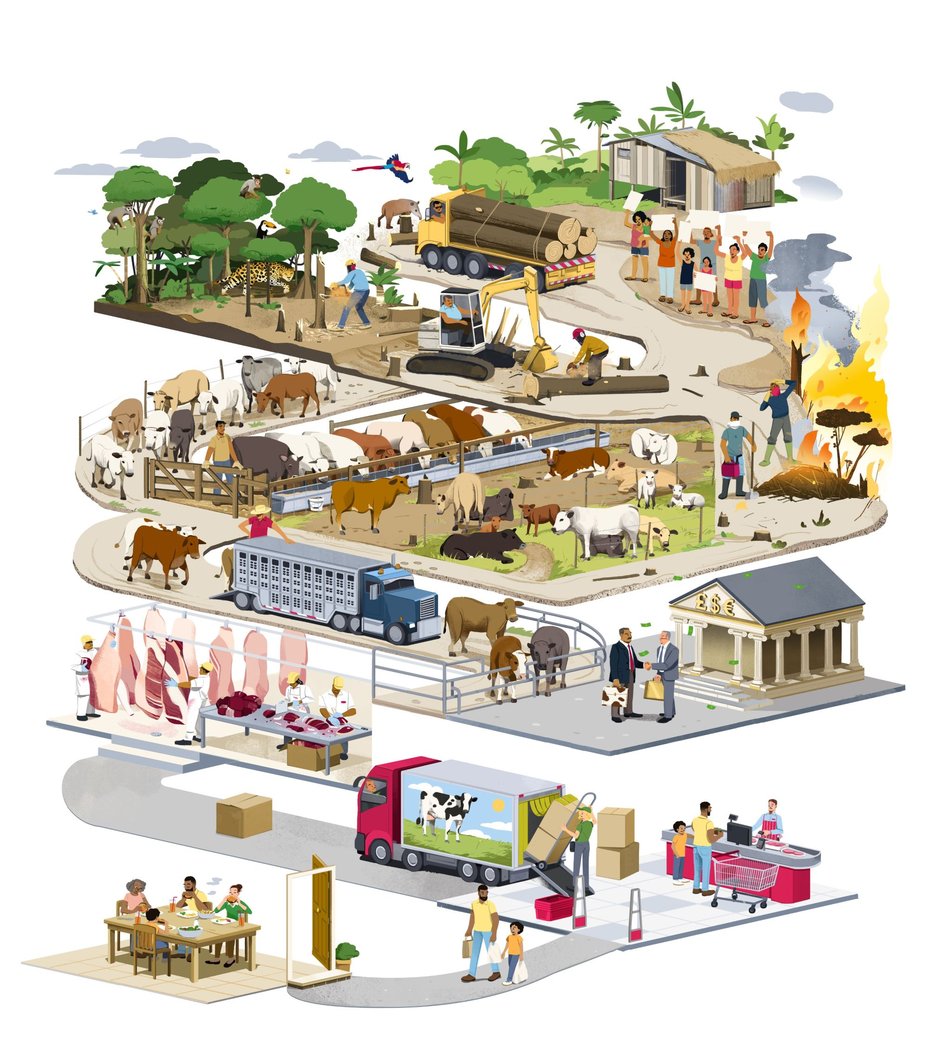
The supply chain linking beef to Amazon deforestation, with banks’ backing
In our December 2020 report Beef, Banks and the Brazilian Amazon we had revealed that between 2017 and 2019, Brazilian beef giant JBS had bought cattle from 327 ranches in the Amazon state of Pará that failed to comply with its legal no deforestation obligations. (JBS denied these allegations.)
Since then, federal prosecutors carried out an official audit of JBS’s cattle buying in Pará between 2018 and mid-2019, which was published in October 2021. This found 43.69% of the company’s audited purchases were not compliant with its legal obligations, though JBS contested 11.7% of these, arguing they were justified.
It was the worst performing of the audited companies for deforestation, confirming the findings of our report, at a time when Amazon deforestation is at its highest since 2006.
As a result of these failures, JBS agreed with prosecutors to pay almost $1 million to the state of Pará, to be spent on improving ranchers’ compliance with Brazil’s forest law. The new agreement obliged JBS to adopt more stringent controls, mirroring one of our report’s recommendations.
Prosecutors also announced an investigation into JBS’s cattle purchases from one of the ranches featured in our exposé.
Protecting land and environmental defenders
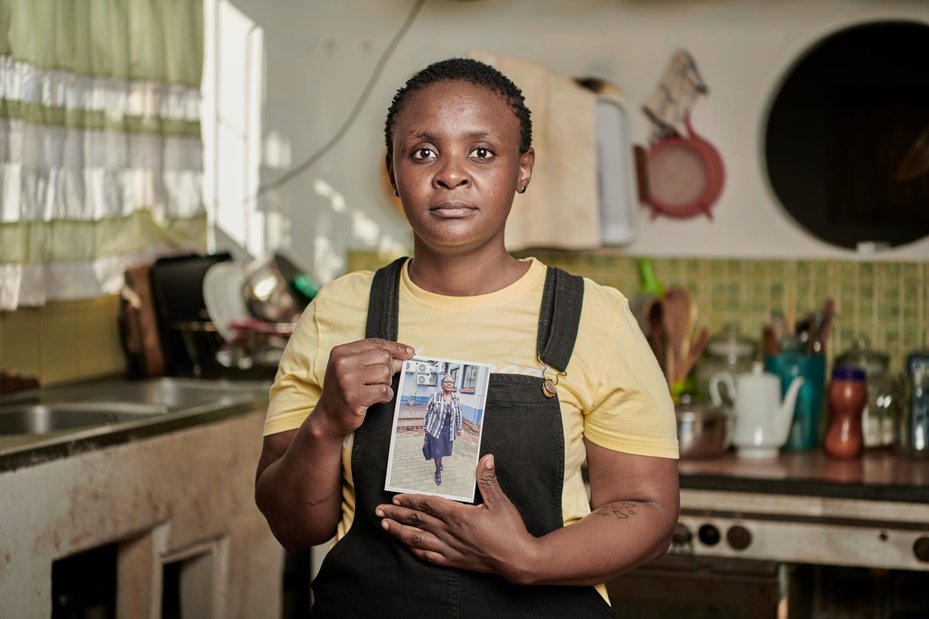
Fikile Ntshangase was murdered for opposing a coal mine in South Africa. Her daughter holds a picture of her
Land and environmental defenders play a crucial role in protecting their land - and our climate – against destructive business practices. Yet more defenders than ever are being killed, while others are threatened, criminalised and attacked.
Our campaign aims to protect defenders and ensure the businesses, financiers and governments complicit in their harm are brought to justice.
5) Spotlight on our annual land and environmental defenders report
Our ninth annual land and environmental defenders report, published in September, captured global attention, shining a light on the violent threats facing land and environmental defenders in key countries around the world.
It continues to be widely used as an important tool and resource for policy-makers and influencers in this area, ranging from national parliaments and government agencies to regional and UN bodies, civil society organisations, donors and the media.
For example, in September, three peers in the UK House of Lords, including Environment Minister Zac Goldsmith, referred to the annual report in interventions calling for amendments to strengthen the provisions on Indigenous people in the UK draft Environment Act.
Later, in October, the report was relied on by members of the US Congress to urge the US Secretary of Treasury and US Secretary of State to apply sanctions against those responsible for attacks against environmental defenders.
Significantly, this year, our report played a critical role in highlighting Latin America as one of the most dangerous regions for environmental defenders and has helped build momentum for the adoption of the Escazu Agreement – the world's first inter-governmental agreement with provisions on human rights defenders in environmental matters applicable in Latin America – which came into force in 2021.
More recently, the Parliament of Chile referred to our report in deliberations to ratify the Escazu Agreement.
In 2021, for the first time, we also created new ways of analysing and presenting the data, making it more accessible to the civil society groups and journalists who use the information in their own campaigning or reporting on a regular basis.
We achieved widespread broadcast, print and digital media coverage, including a 15-minute interview slot for one of our Mexican partners and Global Witness’s CEO with CNN’s Christiane Amanpour.
6) Companies held to account
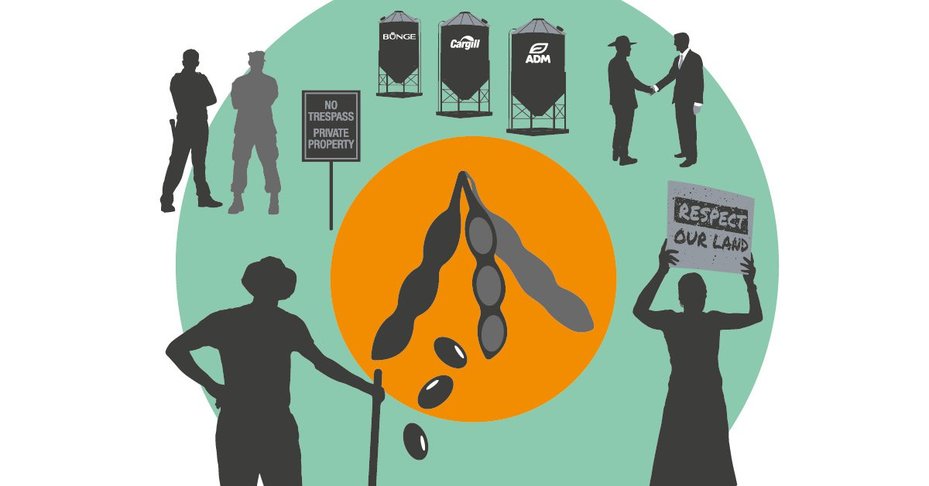
Our report Seeds of Conflict exposed how global agricultural commodity traders that export conflict-tainted soy to Europe, including ADM and Bunge, have contributed to human rights abuses by soy producers against a traditional community resisting the expropriation of their lands in the Brazilian Cerrado.
This triggered an investigation by ADM into our findings and we continue to press these global agri-commodity giants to provide redress and prevent human rights abuse and attacks on defenders throughout their supply chains.
We also worked alongside partners to secure a shareholder vote demanding action by Bunge to tackle soy-driven deforestation in the Brazilian Cerrado, which was passed with overwhelming support, and secured a commitment from trader Wilmar to introduce a new Human Rights Defender policy.
End the growth of fossil gas
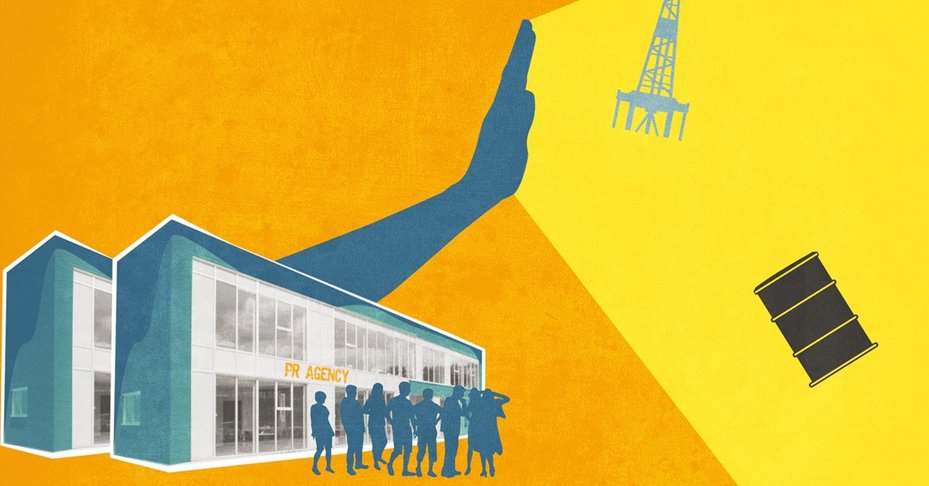
Fossil fuel industry will not be able to brand highly polluting fossil hydrogen as renewable. Global Witness
While much of the world has woken up to the dangers of oil and coal, gas production threatens to derail climate efforts. We are standing up to the fossil fuel industry’s efforts to present fossil gas as climate-friendly - and ensure governments transition to genuinely renewable sources of energy.
7) Major blow to fossil fuel lobbying efforts for fossil hydrogen to be classed as "renewable"
In July, the European Commission agreed not to include fossil hydrogen in its proposed reform of the Renewable Energy Directive, achieving one of our key campaign goals.
The fossil fuel industry had been pushing for its inclusion, which would have allowed highly polluting fossil hydrogen to be branded as renewable.
Global Witness led a coordinated advocacy effort bringing together NGOs, MEPs and progressive parts of the industry to ensure it was excluded from the Commission's proposal.
8) Blocking funding for new fossil gas infrastructure
In December, EU institutions agreed the final text for the revision of Trans-European Networks – Energy (TEN-E) regulation.
Over the course of the negotiations of the regulation, we released multiple investigations on the harms of the EU’s support for new gas infrastructure, lobbied decision makers in the Parliament, Commission and Council, supported by an integrated and responsive communications strategy.
We made significant progress in improving the regulation from the previous version, though the end result fell short of our objectives.
As a result of our work, there will be no new funding for dedicated fossil gas infrastructure projects (for example new pipelines or import terminals), with the exceptions of the proposed East Med pipeline from Israel to Cyprus and Greece, and the Melita pipeline from Sicily to Malta.
Natural Resource Governance
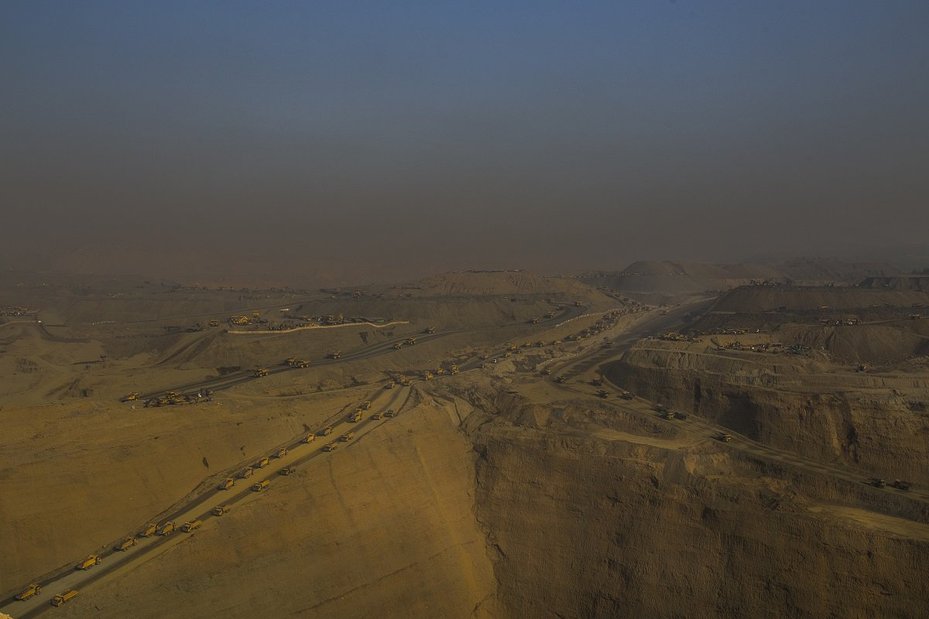
Convoys of dumptrucks are seen operating at the “equal-profit” mining site area of Myanmar Win Gate company, Kachin State, Myanmar. Global Witness
Global Witness has long exposed how precious minerals and other natural resources fuel conflict, prop up corrupt regimes and enrich elites, leaving a legacy of environmental destruction, human rights abuses and instability. We work to hold the predatory international companies behind these deals to account.
9) Sanctions secured in Myanmar
Following the military coup in Myanmar in February, the EU, US and UK adopted targeted restrictive sanctions on individuals and entities that generate revenue for the military, including the military’s two conglomerates Myanmar Economic Holdings Limited (MEHL) and Myanmar Economic Corporation (MEC), and state-owned enterprises, including Myanmar Gems Enterprise.
This was achieved, in part, through the long-running advocacy we have pursued against those using profits from the country’s gem trade to fund conflict and human rights abuses.
Our work was based on years of extensive research and investigations, including two major publications on the links between jade mining and armed conflict, and the Myanmar rubies being sold by luxury jewellers across Europe and the US.
Later, in October, the US Congress introduced bi-partisan Burma legislation that authorises further sanctions against sources of military revenue, including in natural resource extractive industries, and individuals who have committed or been complicit in ongoing atrocities, in line with lobbying and text submitted by Global Witness and our Myanmar civil society partners.
Digital Threats to Democracy

Still from explainer animation "Climate Truths: How is disinformation fuelling the climate crisis?". Global Witness
Big tech and social media platforms depend on a business model where profit is made from stoking up anger and fear. Our data is bought, harvested and manipulated. Despite the serious consequences, companies are subject to little scrutiny. Our campaign aims to change this and ensure accountability for the harm done.
10) Progress on a ban on targeted political advertising
This year, two European Parliament committees called for a ban or substantial restriction on targeted advertising across digital platforms, as well as other key Global Witness recommendations such as disclosure of the sponsor on advertisements and turning off profiling by default.
This is a step towards our aim for government regulation and oversight of social media companies – including their recommendation algorithms, which otherwise will continue to amplify dangerous messages and do so much damage in the offline world.
To help achieve this result Global Witness worked in close coalition with others to influence the EU institutions, published major new polling to counter industry narratives, and released several hard-hitting investigations to expose the problem and need for regulation – including how Facebook’s algorithm promoted violent content and misinformation in Myanmar, and approved incendiary political ads in Northern Ireland.
Spotlight on the UN Climate Change Conference (COP26)
As our new climate-facing campaigns hit their stride, we used COP26 to amplify our case for change across three core areas: exposing the corrupting influence of the fossil fuel lobby; stopping the financing of deforestation; and protecting land and environmental defenders.
Across the two weeks of the Conference, we worked hard to bring these issues to the fore, as well as highlighting the missing voices of so many Indigenous and youth climate activists, including through:
Exposing the fossil fuels lobby’s outsized presence at COP26 and holding the summit’s organisers to account
Our Data Investigations, Gas and Communications teams acquired a full list of the 28,000 delegates at COP26. Then, working with partner organisations, Stop Corporate Abuse, Corporate Observatory Europe and Glasgow Calls Out Polluters, we arranged and analysed the data to reveal that:
- There were over 500 fossil fuels lobbyists at COP26, collectively comprising a bigger delegation than any country.
- The fossil fuel lobby at the conference was larger than the combined total of the eight delegations from the countries worst affected by climate change in the past 20 years.
- Fossil fuel lobbyists dwarf the UNFCCC's official Indigenous constituency by about two to one.
We released our findings in partnership with the BBC, which ran it as one of their top three stories through the day. Other outlets, including CNN, quickly picked it up too.
The attention prompted questions to be posed by media to COP26 President, Alok Sharma and the UNFCCC Executive Secretary, Patricia Espinosa, on whether the number of fossil fuels lobbyists exposed by Global Witness explained the lack of mention of fossil fuel phase-out in the summit’s draft outcome text.
Shortly after this, it was reported that senior figures from two of the world’s biggest polluting fossil fuel firms, BP and Shell, withdrew their participation from side events they were due to speak at.
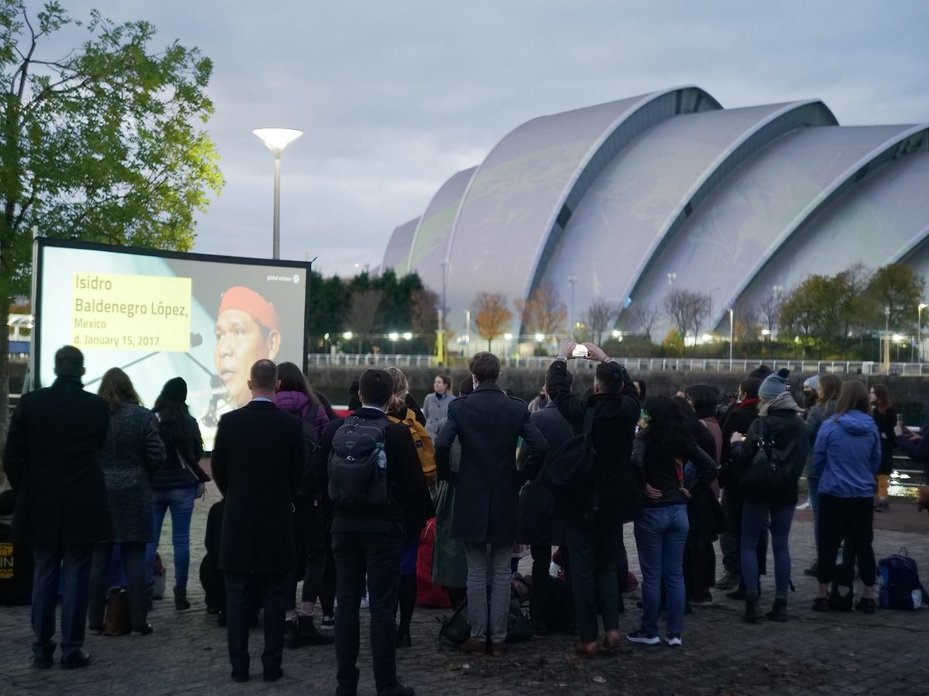
Projection in Glasgow commemorating the 1,005 Defenders who have been killed since the adoption of the 2015 Paris Agreement. Global Witness
Our case for regulation of deforestation-financing banks recognised by UK minister
A fortnight before COP26, we published the findings of a new investigation, Deforestation Dividends, into the banks and asset managers financing – and massively profiting from – agribusiness industries that are destroying forests.
Many of these banks have no-deforestation policies, have committed to align with the Paris goals or are signatories of the Soft Commodities Compact.
Yet, we revealed how major US, UK, EU and Chinese banks have, since the Paris Agreement, collectively piled $157 billion into 20 notorious firms including Olam, Wilmar, Sinar Mas, JBS, Marfrig and Minerva, and likely made $1.74 billion as result.
Financial giants who have repeatedly profited from these deals include HSBC, Deutsche Bank, JPMorgan, BNP Paribas, Rabobank and Bank of China.
When governments and financiers announced a new deforestation pledge on 1st November at COP, we were able to hold up our findings as a mirror both to the $19.2 billion package being pledged, and the track record of banks promising, once again, to stop financing forest destruction.
We made the case that it will only be through robust regulation – not headline grabbing commitments – that real change will be generated, conveying this though broadcast interviews, notably Voice of America, Al Jazeera, Sky News, UK Channel 4 News, and a wide array of print media outlets, including Reuters.
When challenged about our findings by our Director of Campaigns, Seema Joshi, FCDO Minister Lord Goldsmith admitted, for the first time in public, that regulation would be needed if finance continue to fund deforestation. We were able to use this shift in position in our advocacy on the UK Environment Bill and other secondary legislation.
Elevating the demands of land and environmental defenders
Building on the launch of our annual report on the violence and discrimination against, and harassment of, land and environmental defenders, we worked with our partners and Indigenous rights groups to stage a commemoration of the 1,005 land and environmental defenders killed since the Paris Agreement.
This featured speeches from activists from Ecuador, Peru and the Philippines, and a projection of the names of all 1,005 defenders on a big screen opposite the COP26 venue.
We also provided access to COP26 passes to land and environment defenders and activists to help participate in what has been described as perhaps the least inclusive COP to date.
Step into 2022: Russia’s invasion of Ukraine
Like many, we watched in horror as Vladimir Putin’s troops entered Ukraine, attempting to seize key cities and ports. We saw the traumatic scenes of people fleeing their homes, families broken up and the unmarked graves of those killed.
As has been clear across the media coverage and statements made by Ukrainian leaders, Europe’s dependence on Russian energy exports is making this war possible – Europe gets around 40% of its gas from Russia and around 20% of its oil.
Revenues from oil and gas are paying for Putin’s war in Ukraine. Since the invasion, the EU is estimated to have spent over €60 billion on Russian fossil fuels. Cutting off this flow of finance as soon as possible must be an essential part of any international response to the crisis.
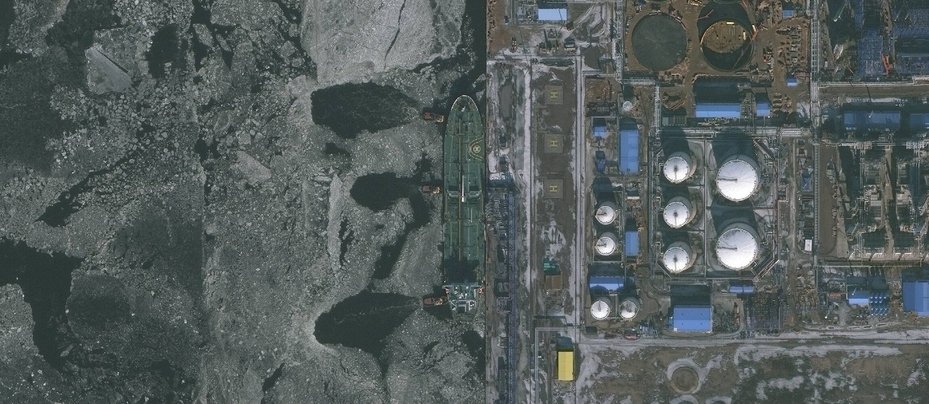
An oil tanker chartered by shell docks at the Russian port of Ust-Luga on 14 March 2022. Satellite imagery © 2022 Maxar Technologies
In the three months since the invasion, we have developed a new project aimed at investigating and exposing the oil and gas deals underwriting Putin’s aggression and pressuring the key players involved to end any profiteering at the expense of Ukraine’s people.
This aligns not only with our longstanding campaign into the corruption and bad deeds of the fossil fuel industry, but also in our push for world leaders to finally invest in long-term energy solutions that will not only reduce dependence on states with appalling human rights records, but also contribute to mitigating unsustainable global warming.
This work is built upon a series of fast turnaround investigations and pieces of data analysis, aimed at building public understanding of the role fossil fuels are playing in this conflict, supporting the case for robust sanctions, and calling for an acceleration of the transition towards a green energy future.
We have built up a network of partners and activists, from across the climate movement and within Ukraine. In particular, we have been advising Oleg Ustenko, economic advisor to President Zelensky, who we have supported to engage with a series of fossil fuel companies and their enablers to pressure them to end their trade with Russia, as well as on high profile media interventions across the global press.
We have developed our own system to track the shipments of oil, gas and coal from Russia, identifying the ships, the insurers, the companies making the sales and the ports in which they are due to be offloaded. We are sharing this data with Ukrainian technicians, who are doing some similar work, and other NGOs operating in this space.
"While Western countries continue buying Russian gas and oil...they help Putin to wage war against Ukraine."
— Global Witness (@Global_Witness) April 22, 2022
This #EarthDay reminds us that for the sake of peace, it's time to sanction the Russian fossil fuel industry.#FossilFuelsFundWar#EndFossilsAndWars pic.twitter.com/wxkisvUNT9
This is, of course, a period of real flux and, one where politics, the media and much of the public is focused on the conflict, so the companies we expose doing business with Russia do feel the need to respond. We quite quickly see policies and corporate approaches shift in response to the work we and our allies are doing. For example,
- In the first couple of weeks of the project, we put Chevron’s role in continuing to ship oil from Russian ports under the spotlight, tracking the movements of tankers carrying their oil and exposing this in partnership with the New York Times.
- Just hours after the CEO of TotalEnergies declared that his company was not “taking any more Russian oil”, our research showed that two oil tankers chartered by Total had picked up more than 1.4 million barrels of Urals crude. Exposing this hypocrisy, alongside work from our Ukrainian allies and partners, exerted sufficient pressure to force Total to strengthen their position on trading Russian oil.
- We have also worked with CNN to reveal how international oil and gas firms have paid close to $100 billion to the Russian Government since Putin’s seizure of Crimea in 2014.
- Elsewhere, we have shone a spotlight on the role of insurers in enabling oil, gas and coal to be shipped out of Russia – via a piece run by Bloomberg – which was swiftly followed by an announcement by Lloyds (one of the world’s biggest insurers) that it would stop insuring Russian State’s Sovcomflot tanker fleet.
- In early May, our data and a letter we coordinated to be sent to the Shell CEO from Ukrainian Government advisor, Oleg Ustenko, was used as the basis for a number of pieces, most notably in the Wall Street Journal and Bloomberg, to expose the ways the fossil fuel industry are getting round their own commitments, including through the shipping of blended oil, which includes some part Russian oil. Just 10 days after the publication of these pieces, Shell & BP announced they would no longer trade Russian blended oil. On the back of this, we were also told the UK Government (and we think others across the EU) are now looking at developing a formal definition of "what constitutes Russian oil."
As I have said over the past 6 weeks: If we cannot end the age of #FossilFuels in the face of civilian slaughter and the destruction of our planet, what will it take? The time is now to boycott Russian oil and gas. #FossilFuelsFundWar https://t.co/AsVTd0umGr
— Олег Устенко (@OlegUstenko) April 6, 2022
As we now look to have an oil sanctions package agreed at the EU level, we will be shifting our focus to addressing the loopholes and gaps in the agreement, the enforcement of the sanctions being brought into force, and pursuing legal avenues for holding companies who continue to fund Putin’s war efforts to account in the court room.
This is fast-paced work, that we took on without funding, responding to the evolving situation. We are so grateful to all those donors who have stepped in to help us develop this important workstream.
Thank you to all our supporters
We appreciate every one of our donors who make all our work possible.
Donors*
- Ackerman Family Fund
- Arcadia Fund – a charitable trust of Lisbet Rausing and Peter Baldwin
- Arcus Foundation
- Ashden Trust
- Bromley Carson Fund
- Brook Foundation
- Camille Massey
- CHARISMA Stiftung für nachhaltige Entwicklung
- Coles Medlock Foundation
- Department of Foreign Affairs and Trade of Ireland
- DFID- Forests, Governance, Market and Climate Programme
- Don Quixote II Foundation
- European Climate Foundation
- Ford Foundation
- The Foundation to Promote Open Society
- The Frederick Mulder Foundation
- Good Energies Foundation
- Grantham Foundation for the Protection of the Environment
- Hopewell Fund
- Humanity United Action
- Jane Thurnell-Read
- Kenneth Miller Trust
- The Kestrelman Trust
- Laudes Foundation
- Luminate
- Michael Hokenson
- The Minor Foundation for Major Challenges
- Nationale Postcode Loterij
- Norwegian Agency for Development Cooperation (NORAD)
- Oak Foundation
- Oliver Hudson
- Patagonia.com
- Postcode Justice Trust, supported by players of People’s Postcode Lottery
- Quadrature Climate Foundation
- Schaffner Family Foundation
- Silicon Valley Community Foundation
- Skoll Foundation
- Susan Gibson
- Swedish Postcode Foundation
- Tilia Fund
- The Waterloo Foundation
- Wellspring Philanthropic Fund
- The William and Flora Hewlett Foundation
*These are the donors that have given their consent to have their gift acknowledged in our Annual Report.
Global Witness Boards**
Board
- Patrick Alley
- Gabrielle Darbyshire
- Charmian Gooch
- Fatima Hassan
- Christine Kanu (appointed 14 December 2021)
- Juana Kweitel (Chair)
- Kirsty Lang (appointed 21 May 2021)
- Olanrewaju Famoru Suraju (appointed 24 May 2021)
- Simon Taylor
Global Witness Trust
- Jeremy Bristow
- Caroline Digby (resigned 31 December 2021)
- Christopher Mitchell (Chair)
- Tony Stevenson
Advisory Council
- Bennett Freeman
- Misha Glenny (resigned December 2021)
- Victor Lopez Illescas
- Camille Massey
- Bandi Mbubi
- Arlene McCarthy OBE
- Christopher Mitchell
- Aryeh Neier (Honorary chair)
- Anita Ramasastry
- Silas Siakor
- Mabel Van Oranje (Chair)
- Edward Zwick
Directors of Global Witness Foundation (US)
- Patrick Alley (President)
- Bennett Freeman (Treasurer, CFO)
- Stafford Matthews (resigned 21 July 2021)
**Membership reflects period between January 2021-December 2021
Income and expenditure statement
The above summarised financial statements are extracted from the full statutory directors’ annual report and financial statements which were approved by the directors and signed on their behalf on 10 May 2022.
These summarised financial statements may not contain sufficient information to gain a complete understanding of the financial affairs of Global Witness. The full statutory directors’ report, financial statements and auditor’s report may be obtained from www.globalwitness.org/en/about-us/financial-statements/
Resource Library
Download our 2021 annual report
Download Resource